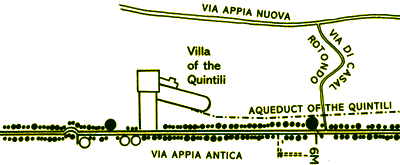|
|
| Barbara is my only Roman friend. Like most Romans, she works in the city and lives in the suburbs. On Saturdays she works only in the morning. Saturday afternoons she entertains me-at least she has so far. This afternoon we're going to visit the Castelli Romani. I wait for her at the metro Arco di Travertino. That's where she parks her car. Barbara drives slowly, a dangerous thing for a Roman driver to do. I used to clutch at the dashboard like an old woman until finally she told me: "Don't to worry. This is the only car that I have." So now I trust Barbara: to not kill us, even when she's shout-talking in Roman dialect on her mobile phone; to know where we're going, even if not how to get there; and to always be late, unless I'm late, in which case she will be early. Today I was early and she was very late. We head south on the Via Appia Nuova. I know this because I have a map. Barbara says when Romans want directions they ask tourists, because all tourists have maps. My map does not indicate in any way the fine-toothed aqueducts that comb the clipped fields on either side of us. "Look!" I point. "Bah," Barbara says, "I see them every day." I tell Barbara I want to see the Via Appia Antica, the part that still has sections of ancient Roman paving stones. But she says no, it's too bumpy to drive there. Later, on the way home from a late dinner outside of Frascati, Barbara informs me that we are driving on the Appia Antica. "Right now?" I ask. It's too dark for me to consult my map, and I'm often confused about time in Rome. I have no past here yet, and Barbara's English has no past perfect. "Yes," she says. "But not in this section of which you speak." The road is narrow, high-walled and dark. We almost fail to see a car stopped ahead of us. Swerving to avoid it, we just miss the protruding ass of a prostitute who leans into the rolled-down window of the car. Barbara makes a menacing hand gesture. "You see-Roman drivers! They stop anywhere they like!" The next week, when Barbara and I meet at Arco di Travertino, we arrive at the same time. I take this rare instance of mutual punctuality as a good sign, but Barbara finds it disturbing: "There must to be a reason," she insists. According to my map, we are driving out of Rome on the Via Tuscolana. Barbara stops the car suddenly to point out two ancient buildings. They are medieval, but Barbara uses the word ancient whenever she means "old." She says the buildings are owned by an auto mechanic who does very good work but can't expand his business. Because his buildings are considered historic he's forbidden to make any changes to them. I don't know if Barbara thinks this is funny, stupid or sad. Traffic rushes past us. "Barbara. Last week you complained that Roman drivers stop their cars in the road, but now you stop in the road." "I am a Roman. When I say the Romans do something, it is because I also do this thing." We slip back into the stream of traffic. Long umbrella pines line the road. Humpbacked aqueducts chase us. All roads also lead out of Rome. J. R. Carpenter 2005-2006 "At Rome often a simple shack is monumental." |

